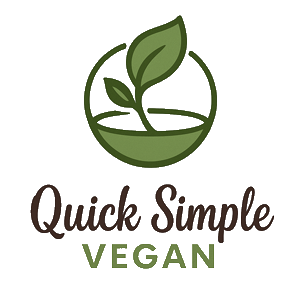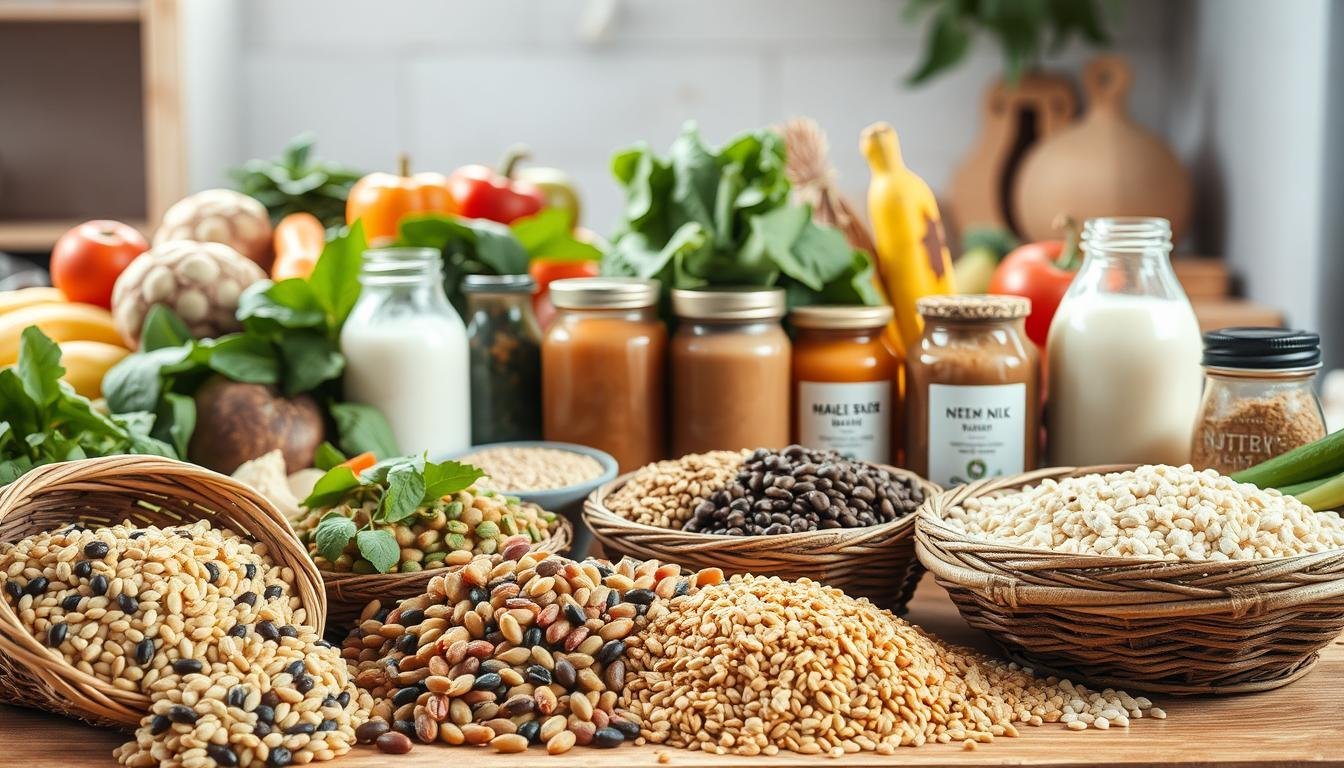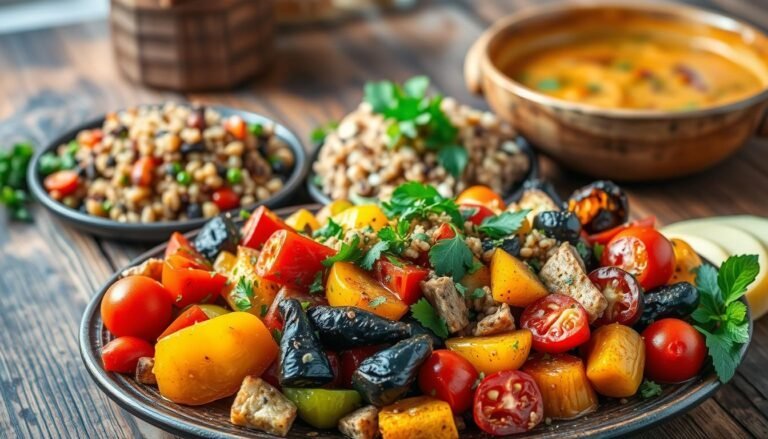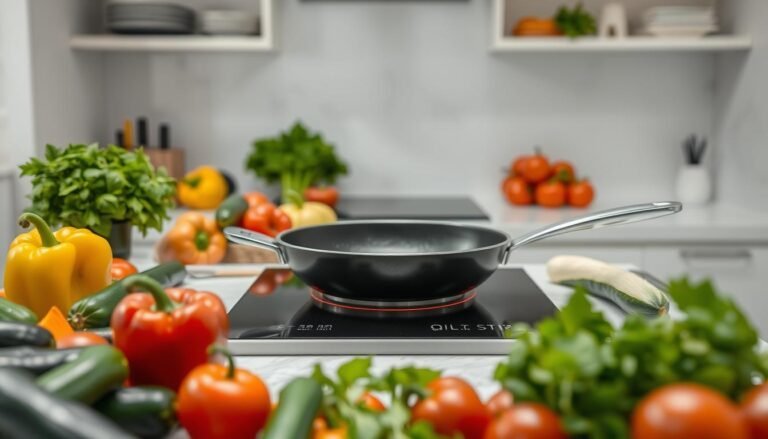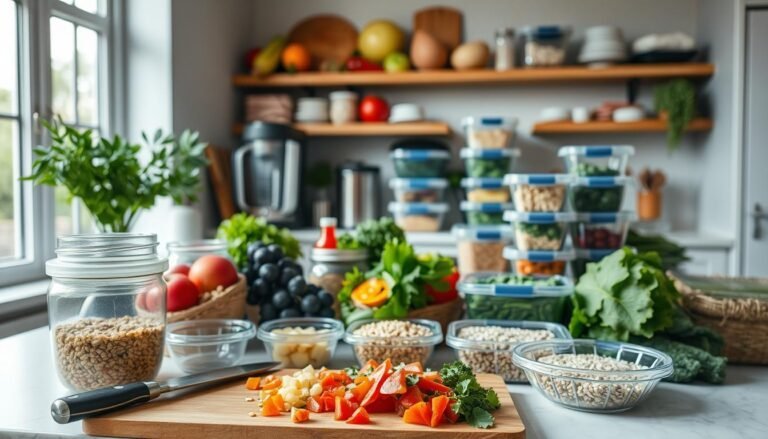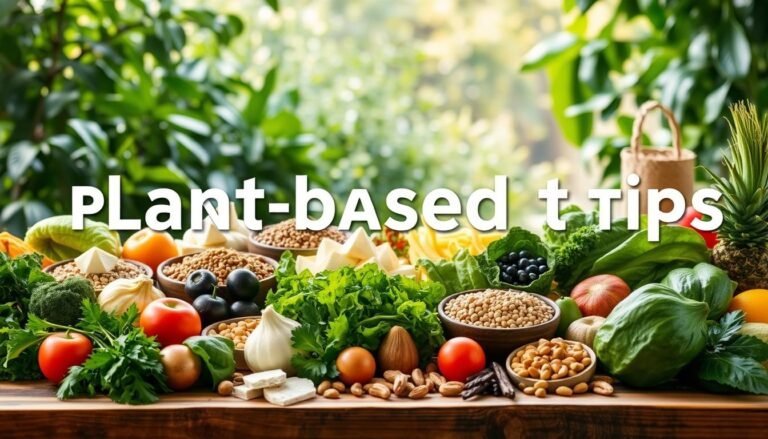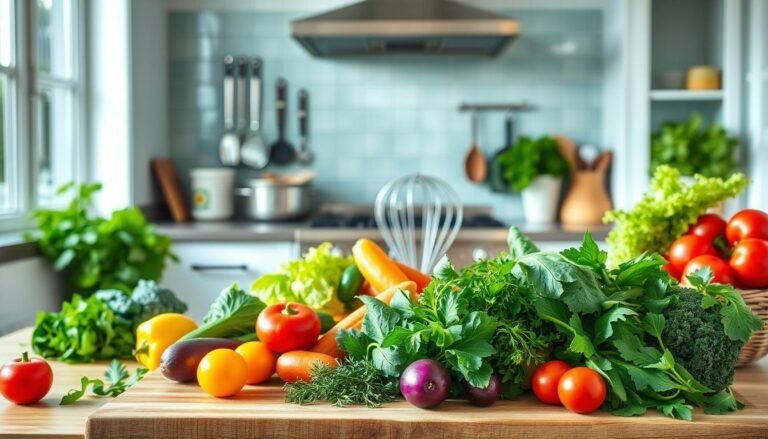Disclosure: This Post Contains Affiliate Links; We earn a commission on purchases.
Starting a pantry for plant-based meals is key to a healthier life. It helps you make nutritious meals without needing takeouts or processed foods.
Choose whole foods like grains, legumes, nuts, and seeds. They are full of nutrients and can be used in many dishes. Don’t forget canned goods like beans and tomatoes. They add protein and flavor to your meals.
Key Takeaways
- Focus on whole foods like grains, legumes, and nuts.
- Incorporate canned goods for added protein and flavor.
- Stocking your pantry can lead to a healthier and more sustainable lifestyle.
The Benefits of a Well-Stocked Plant-Based Pantry
A well-stocked plant-based pantry is key to a healthy kitchen. It brings many benefits that make cooking better and help the planet.
One big plus is time and money savings. With the right pantry, you can cook fast and avoid last-minute shopping.
Time and Money Savings
Having a pantry full of basics makes meal planning easier. Buying in bulk and planning meals saves money over time. This makes a plant-based pantry smart for your wallet.
Nutritional Advantages
A good pantry has whole foods like grains, legumes, and nuts. These foods are full of nutrients. Adding must-have vegan pantry items to your diet boosts your health.
Environmental Impact
Choosing plant-based foods cuts down on greenhouse gas emissions. Supporting local farmers and reducing waste also helps the planet. A well-stocked pantry is good for the environment.
Essential Grains and Legumes
Grains and legumes are key in a plant-based diet. They give us fiber, protein, and important nutrients. These are vital for staying healthy.
Whole Grains to Keep on Hand
Having whole grains in your pantry is a must. They are full of vitamins, minerals, and antioxidants. These help keep you healthy.
Rice Varieties
Rice is a basic grain with many types. You can find brown, white, and wild rice. Each has its own taste and texture, perfect for many dishes.
Other Nutritious Grains
Grains like quinoa, bulgur, and barley add variety to your meals. They are also full of nutrients.
- Quinoa is a complete protein, making it great for plant-based meals.
- Bulgur is high in fiber and minerals.
- Barley is full of fiber and is excellent in soups and stews.
Protein-Packed Legumes
Legumes are vital in a plant-based diet. They give us protein and fiber. You can find them dried or canned.
Dried Beans and Lentils
Dried beans and lentils are rich in protein and fiber. They are essential for plant-based cooking.
Canned Legume Options
Canned legumes are easy for quick meals. They need little prep.
Storage Tips for Grains and Legumes
Storing grains and legumes right is key. Keep them in a cool, dry spot in airtight containers. This keeps them fresh and nutritious.
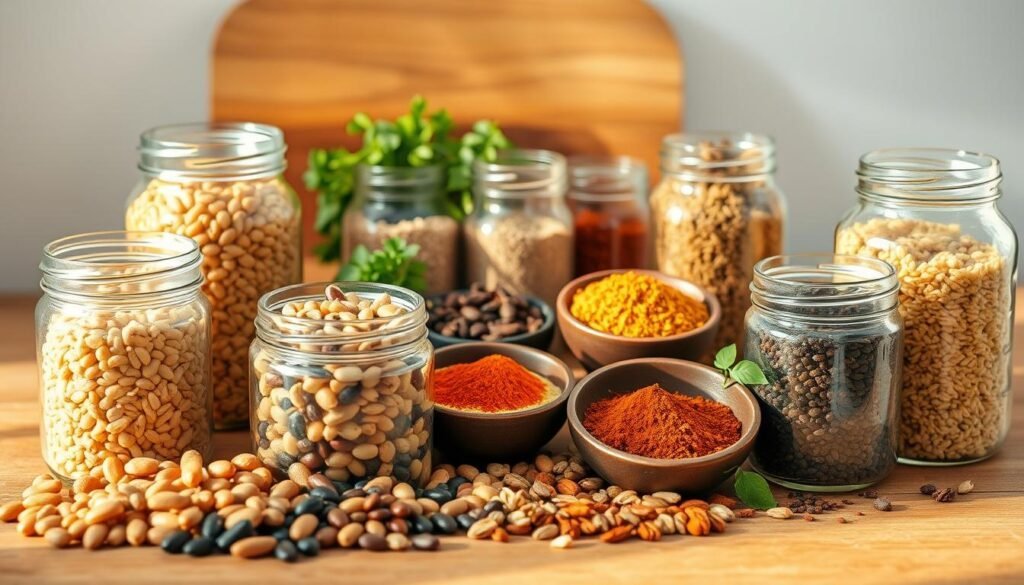
Nuts, Seeds, and Healthy Fats
To make great plant-based meals, you need nuts, seeds, and healthy fats. These add texture, flavor, and are full of good fats and protein.
Versatile Nuts for Cooking and Snacking
Almonds, walnuts, and pecans are great for snacks and cooking. They work in salads, stir-fries, baked goods, and desserts. Here are some ways to use them:
- Add sliced almonds to oatmeal or yogurt
- Use walnuts in baking or as a topping for salads
- Snack on pecans as a healthy alternative to chips
Nutrient-Dense Seeds
Chia, flax, and hemp seeds are packed with nutrients. They’re good for baking, smoothies, and as toppings. They offer many health benefits.
Seeds are high in fiber and omega-3s. They’re rich in protein and antioxidants. They can also lower cholesterol.
Plant-Based Oils and Butter Alternatives
Plant-based oils like olive oil, coconut oil, and avocado oil are key for cooking and dressings. Nut butters, like peanut butter and tahini, are perfect for baking and sauces.
Storing Nuts and Seeds Properly
Keeping nuts and seeds fresh is important. Store them in the fridge or freezer to keep them fresh. Use airtight containers to keep their flavor and nutrients.
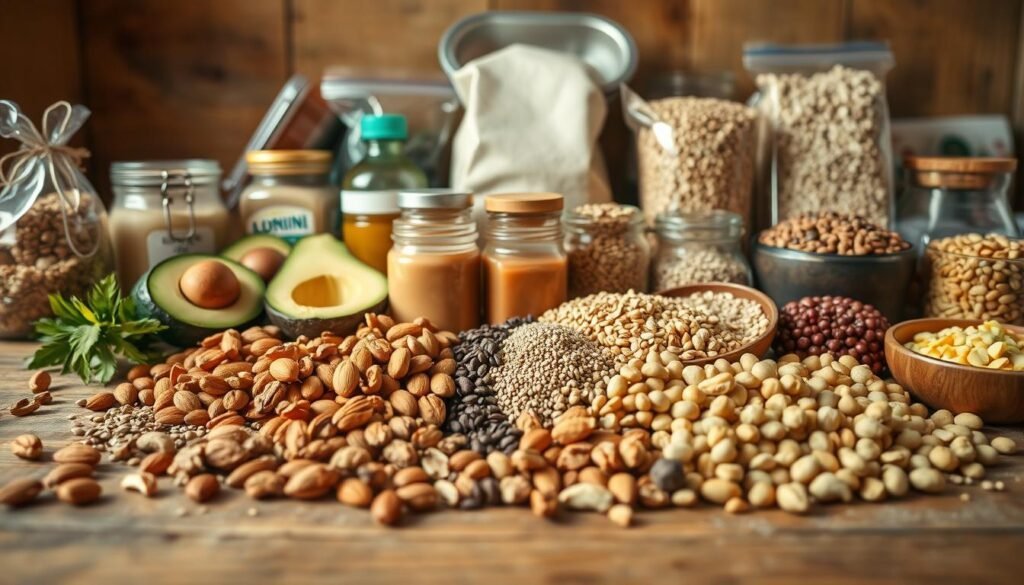
How to Stock Your Pantry for Plant-Based Meals: Canned and Jarred Goods
Canned and jarred goods are key for a plant-based pantry. They are easy to use and versatile. These items help make many plant-based meals.
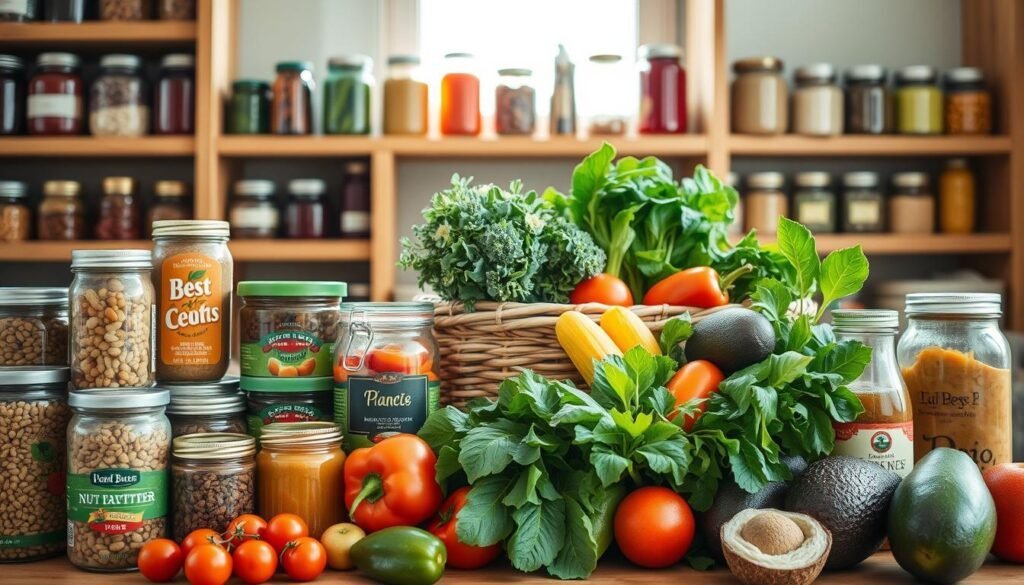
Tomato Products
Tomato products like canned tomatoes and paste are must-haves. They add flavor and moisture to many dishes. Choose low-sodium and organic options when you can.
Vegetable Broths and Bases
Vegetable broths and bases add depth to soups and sauces. Pick low-sodium ones to control salt in your food.
Canned Vegetables and Fruits
Canned veggies and fruits are quick and nutritious. They’re great in soups and salads. Look for ones with little added sugar and no BPA.
Plant-Based Milk Alternatives
Plant-based milks like coconut milk are versatile. They work in sweet and savory dishes, from curries to desserts.
Specialty Items Worth the Space
Special items like jarred sauces and olives add flavor. They may use up space, but they make your cooking better.
When picking canned and jarred goods, choose ones with less sugar, low sodium, and no BPA. Adding these to your pantry helps make tasty and varied meals.
Herbs, Spices, and Flavor Enhancers
To make plant-based dishes taste great, you need the right herbs, spices, and flavor enhancers. These are key to making tasty plant-based food. They help you make many different dishes.
Essential Dried Herbs
Dried herbs like basil, oregano, and thyme are must-haves. They make dishes smell and taste fresh. For a full list of pantry essentials, see this vegan grocery list.
Must-Have Spices for Plant-Based Cooking
Spices like cumin, coriander, and turmeric add warmth to meals. They’re great for many dishes, from curries to stews.
Umami Boosters
Umami boosters like nutritional yeast and soy sauce make food taste savory. They’re key for rich flavors.
Vinegars, Sauces, and Citrus
Vinegars like apple cider vinegar and balsamic vinegar brighten flavors. Sauces and citrus fruits like lemons and limes add a burst of taste. They make dishes taste better.
Budget-Friendly Pantry Building Strategies
Building a plant-based pantry on a budget is easy with the right tips. You don’t have to spend a lot to stock up. A few smart moves can help you build a pantry that supports your diet without costing too much.
Prioritizing Essential Ingredients
To save money, focus on essential ingredients like grains, legumes, and nuts. These are the basics of a plant-based diet. They can be used in many dishes. This way, you can stock up without spending too much.
Buying in Bulk
Buying in bulk is a great way to save. Buying rice, beans, and nuts in big amounts can cut costs. It also helps reduce waste, making it better for the planet.
Seasonal and Sale Shopping
Shopping during seasonal sales and at farmers’ markets can save money. Plan meals with what’s in season and on sale. This keeps your pantry fresh and affordable, and makes it interesting all year.
By using these tips, you can have a great plant-based pantry without spending a lot. Good pantry organization helps you use what you have best.
Conclusion: Creating Delicious Meals from Your Plant-Based Pantry
A well-stocked plant-based pantry is key to a lifetime of healthy eating. It lets you always be ready to cook. You’ll enjoy making delicious meals.
Stocking your pantry means focusing on whole foods and staples. Grains, legumes, nuts, and seeds add flavor. Canned and jarred goods, herbs, and spices are also important.
To get the most from your pantry, pick essential ingredients and buy in bulk. Use seasonal sales to save money. This way, you can make tasty, healthy meals for any time.
By following these tips, you’ll have all you need for vegan meals. Meal prep will be easy with the right pantry staples.
FAQ
What are the essential items to stock in a plant-based pantry?
How can I stock my pantry on a budget?
What are some must-have spices for plant-based cooking?
How do I store grains and legumes to maintain their freshness?
What are some versatile nuts and seeds that I can use in cooking and snacking?
How can I add flavor to my plant-based meals?
What are some plant-based milk alternatives that I can stock in my pantry?
How can I prevent waste and reduce the need for last-minute purchases?

Focused on simplicity and flavor, Ryan helps readers create quick vegan meals and snacks without the overwhelm. Whether you’re new to vegan cooking or just want to keep it simple, Ryan’s tips, guides, and no-fuss approach make plant-based eating accessible and enjoyable for everyone.
Subscribe to Our Newsletter
